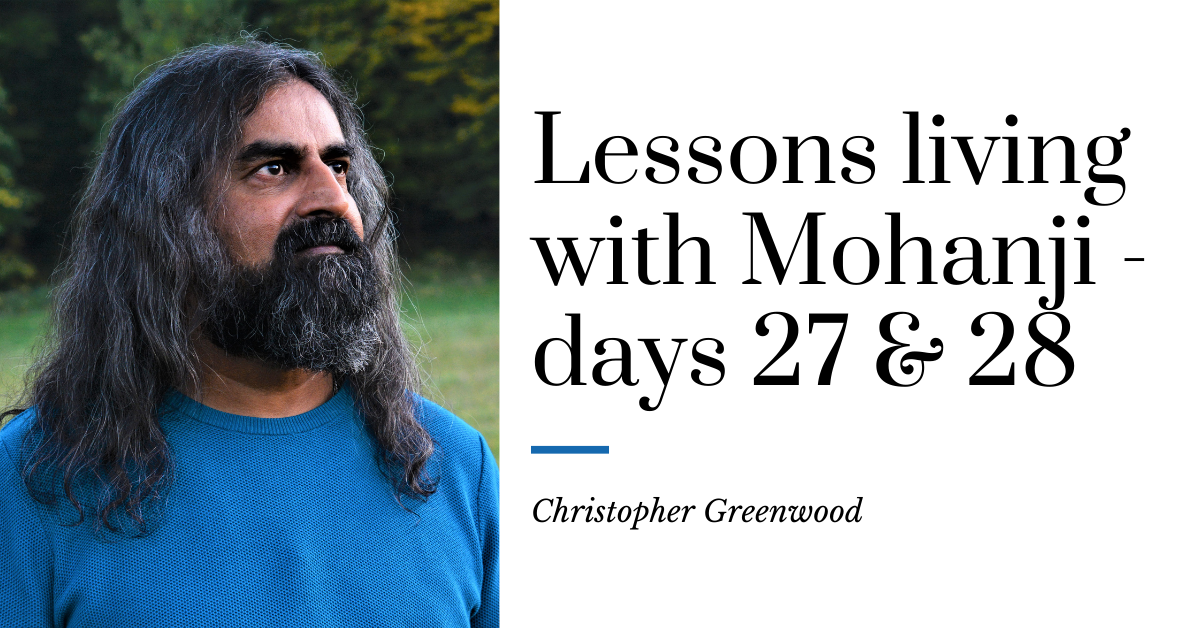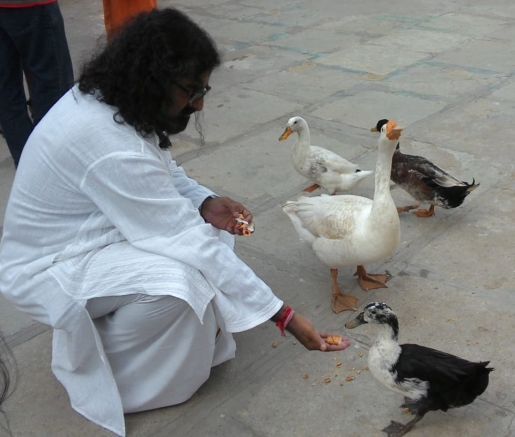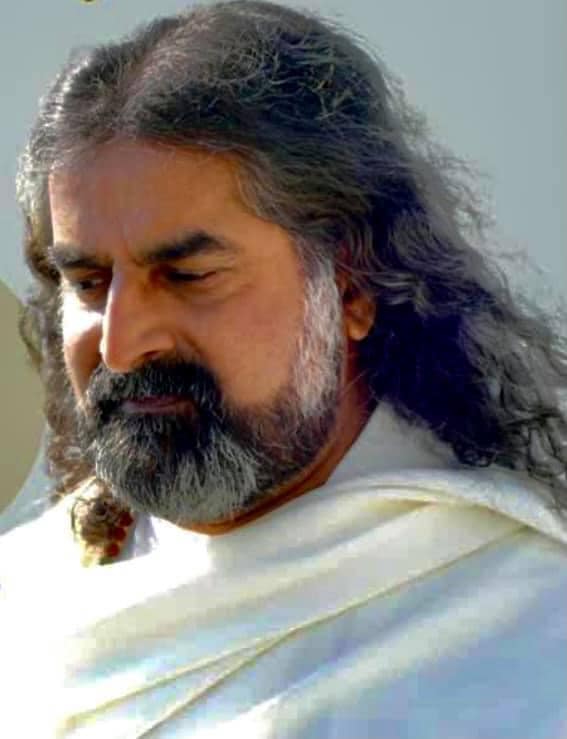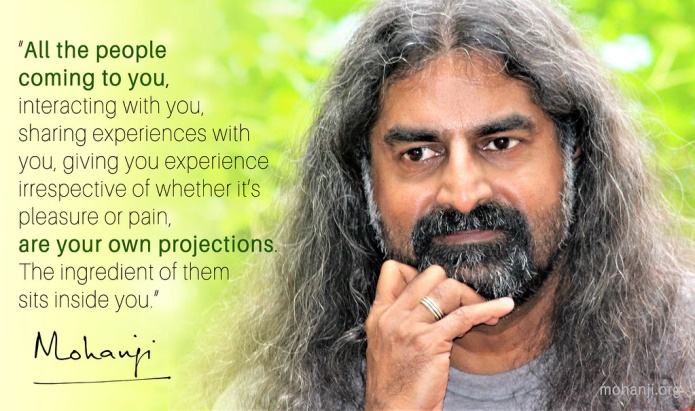By Christopher Greenwood
Day 27 Lesson – Harmony and Ahimsa️ at home
Good morning, everybody. I hope you’re doing well.
Today, I wanted to share an aspect of Mohanji’s core living teachings: Ahimsa or non-violence. The morning was really nice; it was sunny; it was calm, very peaceful. I went to see Mohanji in the morning to talk about daily activities. He was also equally calm today. He was writing a piece in response to a request for a magazine article.
He had the window open. So in the room, he has his chair, and he faces the door as you come in. Just to the left of him, there’s a nice window. In the morning, he raises the blind, and he opens the window. He has a clear eyeshot of the trees outside and the neighbouring piece of the garden from his chair.
This is where every morning, the birds come, and they’ll stay for the morning time with Mohanji. They’ll sit there on the branches. Many come to see him, they have their breakfast, as I’ve mentioned before, and then they stay for some time. Even the squirrels, they’re enthusiastic to see him too.
In the morning, he sat there with the window open so that they could come and see him, and they’re happy and content. So each morning, this happens; they have their food, and they stay for some time. It’s a very calm, harmonious atmosphere.
Today, there was a bit of silence, so we listened to the birds for a bit. They were making really interesting sounds, sounds of deep contentment as they chirped and sang from the trees. They had their food. Mohanji spoke that this is their way of showing gratitude. They understand where the food has come from and from where it has been given.
He said, “When you listen carefully, and you become more attuned to nature, you can actually feel the communication.” Most of the time, we’re not so aware of it because we’re so busy within, so occupied with our mind. But he says that when beings around the house are happy and peaceful, and when they are content, that brings grace to the home. So by serving them, giving them food, by giving them contentment, they bring grace to the house.
I can relate this back to Ahimsa or non-violence, that Mohanji practices and lives. Even now, when I speak to him, he always says that he doesn’t want to bind anyone; he thinks people should be completely free to experience whatever they want in life. If somebody wants to drink, that’s fine. If they want to go out and party, that’s fine. If they want to do something else, that’s fine. He has no real interest in that, from the point of view of right or wrong. He thinks everyone should have the free will to do whatever they want. Because in the end, it’s the individual who will be paying for whatever they’re doing, either through their body or through whatever else they’re accruing.
The one condition that he does say is that whatever activity is done, it should not harm another being. So anything is fine, provided it’s consensual and non-harmful, non-violent. This is the main reason why he practices veganism, because of all the violence and the exploitation of millions of beings across the world, just for somebody else’s taste, just for somebody else’s satisfaction. So, he is against all the cruelty that’s involved, the suffering, and the violence. That’s why he promotes and practices veganism.
He spoke a little bit more about this today because of his interaction with the birds. We are, as a being, constantly transmitting who we are, whether we’re aware of it or not. So what’s inside us, we’re transmitting out to the world, we’re projecting out as a subtle frequency. We’re constantly transmitting our own personal frequency, which is made up of our patterns, inclinations, habits, or attitudes towards life.
As we were speaking, when I thought about this, this is why we have a good or bad feeling about some people. There’s an intelligence that helps us pick up these subtle frequencies, and we say that we have a gut feeling about right or wrong or what this type of person is like. So he said when we consistently start to practice Ahimsa, we start to become that, we start to become more peaceful, we start to become less violent. Then the more receptive animals start to respond to that and begin to feel safe. So this is the interaction that’s happening.
I’m sure many people have experienced this with animals and themselves, or even witnessed it, where sometimes animals are attracted to certain people more than others, or you see dogs barking at some people for no reason. So they’re picking up on this feeling. The birds outside, all the animals outside, they’re giving this contentment, they’re singing these songs, they’re showing their gratitude to Mohanji, which he accepts.
Today as well, something I didn’t quite pick up on, but there was a bit of maybe a divine play happening because the smell of sandalwood appeared in the room from nowhere. I didn’t notice this myself as I have a blocked nose, but somebody else did. It caught their attention. Mohanji simply smiled and said that this is for the animals, they will be able to smell this, and it’s an acknowledgement of their gratitude.
For me, the lesson witnessed was the tangible scenario where the projection and the transmission out to the world of peace, contentment, and non-violence are being given back. I’m thinking now; it’s really important to cultivate that non-violent lifestyle – to have a peaceful existence and a peaceful lifestyle. So bringing these principles more into my life and doing as much as I can to practice them, I can bring more of that back and have that reciprocated back from the outside world. As I can see and witness, Mohanji is already there in that state, which is why he sees all the animals respond to him with such affection, safety, and love.
Thank you for listening, and I hope you have a great day ahead.
Day 28 Lesson – The do’s and don’ts of life
Good morning, everybody.
Today, I wanted to talk about rights and wrongs, or the dos and don’ts of society. Since spending time with Mohanji, I’ve understood more about his perspective and how he sees things differently. Because when I’m speaking with Mohanji, and when he’s also speaking with others, he’s operating from a very different perspective: karmic completion, which means the fulfillment of experiences, which sometimes may not completely fit into societal norms.
For example, when we do things in life, or when we want to do something in life, maybe our friends have opinions, or families might have opinions about what’s right and wrong. Even the larger society in which we live might have those opinions. But Mohanji is very open; for him, there’s no real right or wrong; there’s only experience. He is not interested in our personal decisions or actions, provided that there’s no violence, that whatever the activity is, that it’s consensual, that there is agreement.
This is actually quite a nice way of seeing those things. It puts the responsibility fully on ourselves, as he says, “Why would I be interested in what you do or don’t do? As long as it’s not hurting, it’s fine, as long as it’s not causing violence.” Because ultimately, it’s us who’s paying the price for whatever we do; he has nothing to do with that. So we have a responsibility.
As I spend more time with Mohanji, I understand this more. It’s given more clarity. But before spending time with him, I had some worries and concerns; if I was doing something right or doing something wrong, what would maybe Mohanji think? Does it fit in with the teachings?
I was involved in many things in normal life, like travelling, going out with friends, drinking, partying, the usual. For some reason, I had this tension inside whether what I was doing was right, if it was spiritual. Sometimes, I would even think about whether this would be accepted by Mohanji or by the Mohanji family. Looking back, it seems silly. But I remember it being a real worry at that time.
And since living with him, it’s actually a relief to gain that clarity and understand that really there is no right or wrong, there’s only experience. He said that he couldn’t stop anyone’s experience because that is their free will. But he reminds us, everything comes with a price.
Before I recorded this message, I asked Mohanji this morning; I didn’t want to give people the wrong impression that it’s fine to do absolutely anything you want and just descend into anarchy. But it’s the main learning from Mohanji that anything consensual is okay. That’s fine. So it is an agreement. I think most people or many people would automatically think of sex in that respect. This is definitely one aspect of it. But Mohanji considers this very minor because it’s connected just to our instinct for him. But for him, consensual is agreement.
He gave the example of nature, that when you look at animals, look at lions and deer, something is happening there, which is within the movement of nature. For example, lions will chase a herd of deer, and you’ll see them running through the fields. At some point, one deer will split from the pack. He said that in nature, the deer would understand that there’s the lion’s hunger and accept that it’s probably its time. Maybe it’s one of the older ones. There’s an agreement, a sacrifice, so that’s the type of consensual that Mohanji talks about.
He said, even if a tree is being chopped down in the prime of its life, and there’s no agreement, you can’t say it’s consensual. Now, you may think as I thought as well, how could a tree tell you: okay, chop me down. But it’s more about there’s a time in a tree’s life. I think even people who manage forests, trees, and places like that can tell when a tree is about to fall, so to clear it out of the way, they’ll chop it down. So that type of understanding, that it’s the time and it’s ready to go.
Also, this agreement should be within whatever people do, between two people who want to have those experiences. So if two people want to have an experience, and they’ve agreed, that’s fine. A collection of people want to have an experience, or maybe society wants to have that experience – that’s okay. But not by inflicting, manipulating, or forcefully doing something. That’s not okay because that is violence.
So Mohanji doesn’t object to life experiences; if two people want to experience it, if somebody wants to drink alcohol, no problem because he says it’s them who’s having to handle the impact of it, and not himself.
This extends to something more subtle as well; having respect for other people’s lives and privacy. So everyone has the right to their space, their privacy, and that has to be considered too. Is there an agreement that someone can enter somebody’s personal space, or is there an agreement that their time can be taken? So some more subtle aspects of that message.
One of the main things which I asked about is relationships with others. So I’ve had relationships of various kinds, and I asked this because maybe other people are curious about this, too. Again, he said, it’s the free will of the people involved in relationships, whatever is happening there.
But it’s important to remember, especially with people, that it’s easy to create entanglements, which are not easy to get out of. For example, two people have come together, and separation may have happened, but the feelings can still remain. You may be able to say that you’re not with that person anymore, but if we’re carrying the memories, we haven’t actually come out of that relationship. So many times, people in our life are not actually gone because the memories are still there of what we carry.
In summary, that was about Mohanji’s lessons, which I have picked up on the do’s and don’ts of life, or the rights and wrongs. For him, the only wrong thing is violence. That’s when we’re doing things that aren’t in agreement with other beings, places, people that aren’t consensual. If we want to do something, free will is completely respected, knowing that it often comes with some sort of price.
Thank you for listening. I hope you have a great day ahead.
|| JAI BRAHMARISHI MOHANJI||
Edited & Published by – Testimonials Team, 30th May 2021
Disclaimer:
The views, opinions, and positions expressed by the authors and those providing comments on these blogs are theirs alone and do not necessarily reflect the views, opinions or positions of Mohanji, Mohanji Foundation, it’s members, employees or any other individual or entity associated with Mohanji or Mohanji Foundation. We make no representations as to accuracy, completeness, timeliness, suitability or validity of any information presented by individual authors and/or commenters on our blogs and will not be liable for any errors, omissions, or delays in this information or any losses, injuries or damages arising from its display or use.
We reserve the right to delete, edit, or alter in any manner we see fit blog entries or comments that we, in our sole discretion, deem to be obscene, offensive, defamatory, threatening, in violation of trademark, copyright or other laws, of an express commercial nature, or otherwise unacceptable.
— Mohanji Testimonials Team






